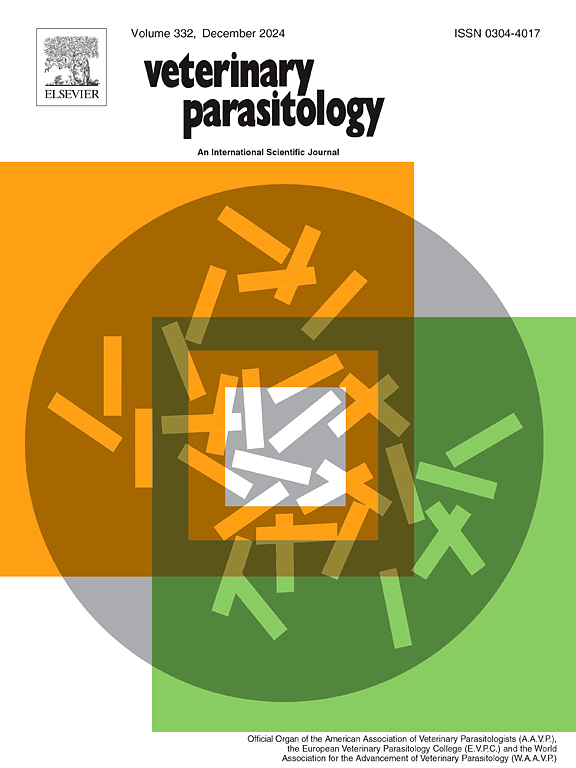Autoantibodies against phosphatidylserine and DNA during canine Dirofilaria immitis infection
IF 2
2区 农林科学
Q2 PARASITOLOGY
引用次数: 0
Abstract
Heartworm infection caused by Dirofilaria immitis induces a devastating disease that greatly affects the global canine population. The mechanism leading to heartworm pathology has been attributed to be mostly by mechanical damage of the worm to the dog´s vascular system and immune-mediated, but the latter processes are not completely understood. Autoantibodies targeting host molecules such as lipids and nucleic acids have been described with pathological roles during malaria and COVID-19 and mediating anemia and thrombocytopenia. We hypothesized that autoantibodies could be present and have a pathological role during canine heartworm disease caused by D. immitis. In this study, we analyzed the levels of autoantibodies (IgM and IgG) against membrane lipid phosphatidylserine (PS) and DNA in the serum of 169 canine samples based on D. immitis infection. First, our results found significant levels of anti-PS IgM and IgG autoantibodies that were associated with D. immitis-positive when compared to D. immitis-negative samples. Second, we found that autoantibodies, particularly anti-PS, are correlated with hematological parameters such as low platelet count suggesting an association with pathologies such as thrombocytopenia. Altogether, these findings elucidate the understudied presence and pathological role of autoantibodies during canine heartworm disease by D. immitis with implications as biomarkers of disease.
犬免疫双丝虫感染时抗磷脂酰丝氨酸和DNA的自身抗体。
心丝虫感染引起的双丝虫炎诱发了一种毁灭性的疾病,极大地影响了全球犬类种群。导致心丝虫病理的机制主要归因于蠕虫对狗的血管系统和免疫介导的机械损伤,但后者的过程尚未完全了解。针对宿主分子(如脂质和核酸)的自身抗体在疟疾和COVID-19中具有病理作用,并介导贫血和血小板减少症。我们假设自身抗体可能存在,并在犬心丝虫病中发挥病理作用。在本研究中,我们分析了169份犬类感染的血清中抗膜脂磷脂酰丝氨酸(PS)和DNA的自身抗体(IgM和IgG)水平。首先,我们的结果发现,与D. immitis阴性样本相比,与D. immitis阳性相关的抗ps IgM和IgG自身抗体水平显著。其次,我们发现自身抗体,特别是抗ps抗体,与血液学参数相关,如血小板计数低,表明与血小板减少症等病理相关。总之,这些发现阐明了自身抗体在犬心丝虫病中的存在和病理作用,并具有作为疾病生物标志物的意义。
本文章由计算机程序翻译,如有差异,请以英文原文为准。
求助全文
约1分钟内获得全文
求助全文
来源期刊

Veterinary parasitology
农林科学-寄生虫学
CiteScore
5.30
自引率
7.70%
发文量
126
审稿时长
36 days
期刊介绍:
The journal Veterinary Parasitology has an open access mirror journal,Veterinary Parasitology: X, sharing the same aims and scope, editorial team, submission system and rigorous peer review.
This journal is concerned with those aspects of helminthology, protozoology and entomology which are of interest to animal health investigators, veterinary practitioners and others with a special interest in parasitology. Papers of the highest quality dealing with all aspects of disease prevention, pathology, treatment, epidemiology, and control of parasites in all domesticated animals, fall within the scope of the journal. Papers of geographically limited (local) interest which are not of interest to an international audience will not be accepted. Authors who submit papers based on local data will need to indicate why their paper is relevant to a broader readership.
Parasitological studies on laboratory animals fall within the scope of the journal only if they provide a reasonably close model of a disease of domestic animals. Additionally the journal will consider papers relating to wildlife species where they may act as disease reservoirs to domestic animals, or as a zoonotic reservoir. Case studies considered to be unique or of specific interest to the journal, will also be considered on occasions at the Editors'' discretion. Papers dealing exclusively with the taxonomy of parasites do not fall within the scope of the journal.
 求助内容:
求助内容: 应助结果提醒方式:
应助结果提醒方式:


